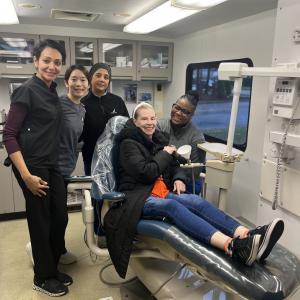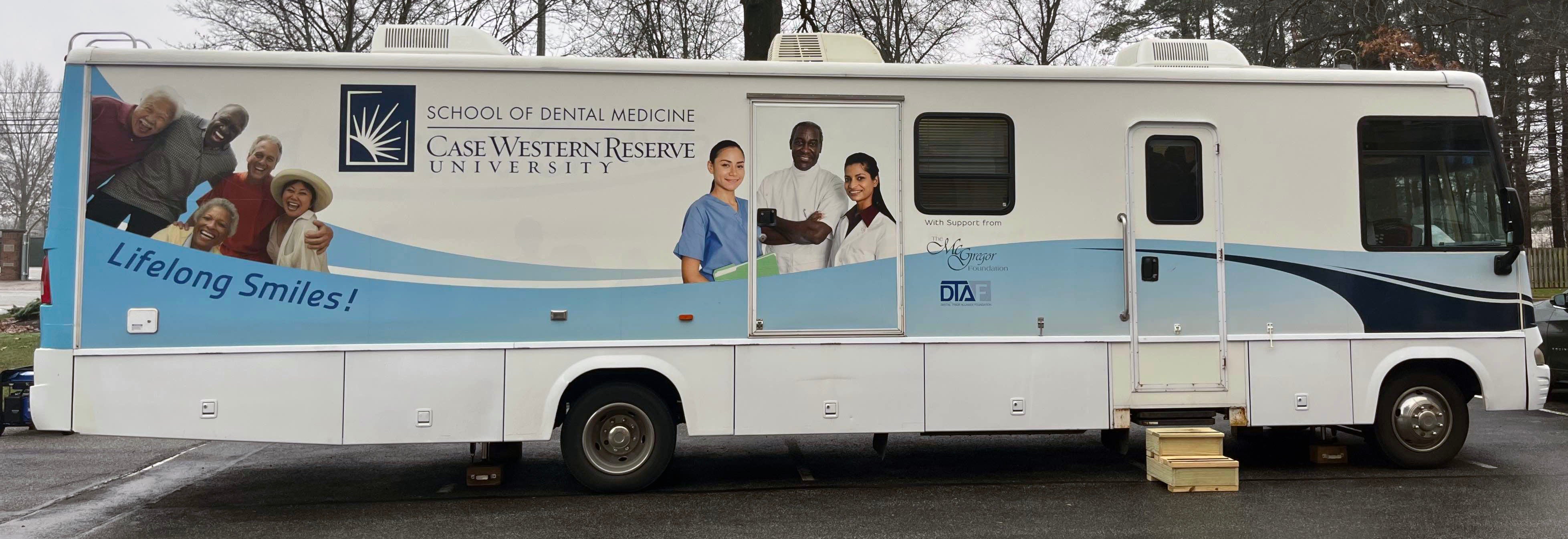Inside a 38-foot mobile RV parked outside an adult day center, fourth-year students from Case Western Reserve University School of Dental Medicine provide essential services to underserved older adults. For these students, this is not just a clinical training ground but also an experiential learning opportunity that cultivates compassion and empathy.
Many vulnerable older adults do not have access to primary dental care, often because of mobility issues and financial constraints. So the CWRU Lifelong Smiles dental van delivers care where it is needed most.
"We eliminate barriers by providing care directly to patients, many of whom are in a wheelchair or have cognitive deficits," explained Suparna A. Mahalaha, DDS (CWR ’98; DEN ’01; GRS ’04, public health), director of the Lifelong Smiles Program. "Many have Medicare but no dental benefits, or struggle to find a provider who accepts Medicaid."
Since its launch in 2015, more than 2,000 patients have received care in the refurbished mobile van, which was built in the 1990s and donated to the school by the Ohio Department of Health. The Lifelong Smiles program was made possible by a $100,000 grant from FirstEnergy, the McGregor Foundation, the Dental Trade Alliance Foundation, the Ohio Dental Association, the Delta Dental Foundation and several other organizations.
The hands-on clinical experience, under the guidance of faculty, not only provides a crucial community service but also equips students with invaluable interdisciplinary training—allowing them to collaborate effectively with established healthcare professionals in medicine, nursing and social work—and ensures a wide array of patient needs are appropriately addressed.
"Firsthand experience working with patients at the adult day care centers gives us a different perspective on not only dentistry but overall healthcare,” said fourth-year dental student Kayla Nero. “Many have challenges with hearing or mobility, so you have to adapt how you provide care."
For Mahalaha, it’s about creating a culture of compassion, addressing the social determinants of health and training the next generation of dental professionals to view their role in providing patient care through a holistic lens.
"I love seeing the students come out of their shells in this environment," Mahalaha shared. "They gain confidence in their ability to treat patients with complex medical or cognitive needs. And most importantly, they learn the value of compassion and empathy—skills that are just as crucial as technical expertise."
For Nero, it’s been important to have the opportunity to care for patients at a different stage of life than she often sees.
"One of my patients is a 95-year-old woman with hearing difficulties who wanted a new denture to improve her smile,” she explained. “We took a bit more time to create and fit her new denture, and she was thrilled. She couldn't stop smiling and proudly showed off her new smile.”
As the program's 10-year anniversary approaches, the RV is now in its third decade of operation—and its age is making it more difficult to provide care.
“It needs many repairs, and we keep trying to fix and patchwork things,” said Mahalaha. “It has been refurbished, but is facing ongoing maintenance issues—making the need for a new van a priority for the program so we can continue to provide crucial dental care to our communities.”
Support the Community Dentistry-Geriatric Van



